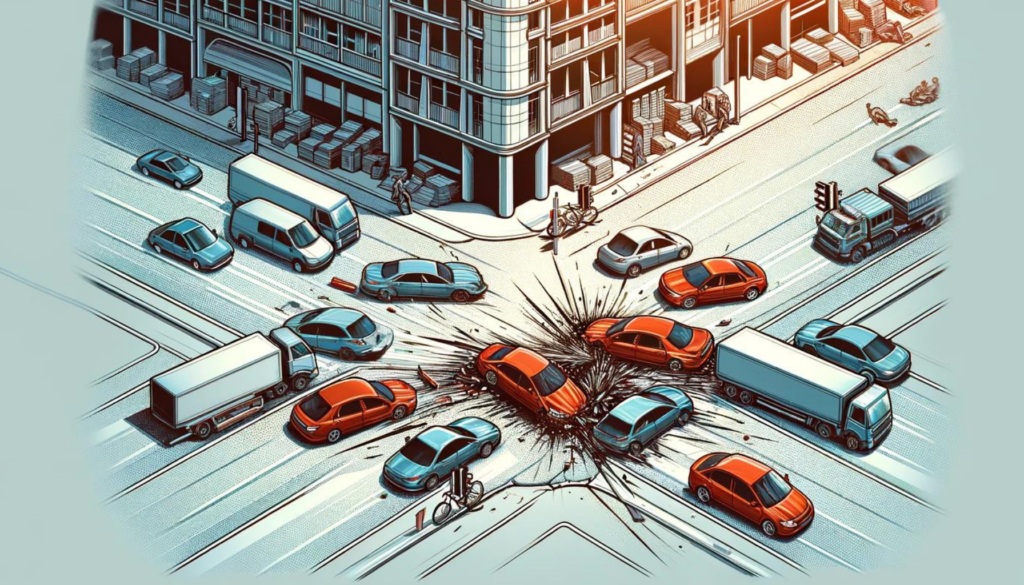
Car accident settlements in Florida (small claims court excepted) range from $10,000 to $15,000 on the low end personal injury claims to millions of dollars on the high end without insurance coverage. Most cases involving severe injuries range from the high five figures to the six figures.
However, averages are insufficient to estimate how much you can expect from a car accident settlement in Florida. Each car accident compensation case has a unique set of circumstances that determine its car accident settlement amounts and potential. Contact Rosen Injury Law for a free consultation to obtain a realistic assessment of your car accident settlement case potential.
The amount of a car accident settlement in Florida depends on the types of damages you sustained, their severity, and whether you are partially at fault. To estimate an amount of auto accident settlement amount amount, we must first determine what damages you qualify for under Florida law.
Types of Damages That You Can Recover in a Florida Car Accident Case
Florida law allows for car accidents and accident victims to sue for economic-, non-economic-, and, in rare situations, punitive damages. Determining the potential value of a car accident settlement begins with the accident settlement process and determining the damages the plaintiff may win in court.
Settlement negotiations have their basis in the likely result of a trial and how much a jury is apt to award. Many factors go into this determination, including the strength of the case, the level of damages, and whether the plaintiff bears partial fault.
Estimating economic damages serves as a logical starting point.

Economic Damages
Economic damages consist of the direct financial costs of the injury. Plaintiffs have the entitlement to recompense for all their financial losses, including the following:
-
Ambulance charges
-
Emergency room expenses
-
Property damage
-
Medications
-
Surgeries
-
Hospital stays
-
In-patient rehabilitation treatment
-
Physical therapy
-
Occupational therapy
-
Lost wages
-
Lost salary
-
Lost commissions
-
Lost bonuses
-
Lost benefits
-
Lost business income
-
Lost self-employment income
-
Lost side-hustle income
-
Lost investment income
For instance, suppose a motorist was hit from behind by a truck while at a red light. In this case, the truck driver is clearly liable. The injured party would then be entitled to all of the economic damage done to him by the accident.
To estimate the damages, we would tally existing medical expenses and future medical bills. For instance, the injured person may already have amassed bills for emergency care, medications, surgery, and rehabilitation.
However, the plaintiff may have ongoing medical needs, such as continued physical therapy or additional surgeries. As a result, we need to estimate these needs and require them as part of any settlement.
Also, the plaintiff may have sustained financial damage as a result of temporary or permanent disability. For example, the plaintiff may have been hospitalized for one month and at home recovering for five months. As a result, he lost six months of work.
To determine lost income, we must tabulate all current and future losses. In some cases, the calculation is simple. If the damages are limited to six months’ wages, it is easy to determine this figure.
But many personal injury cases result in more than lost wages. Did the personal injury claim victim lose benefits? Did being unable to work cost him bonus money? For salespeople, being unable to work can have a disastrous effect on commission income. The loss of commissions may pertain to current accounts and the loss of future accounts, extending the liability for lost commission income into the future.
In addition to medical bills and lost income, the plaintiff likely suffered property damage losses, such as a totaled vehicle and destroyed personal items inside.
Non-Economic Damages

Non-economic damages have a less straightforward calculation. These types of damages often seek compensation to compensate injury victims for the general impact on their lives beyond financial losses. . Injury claim victims have their lives disrupted and diminished, and they deserve compensation for their non-pecuniary damages.
Non-economic damages include the following:
-
Pain and suffering
-
Emotional distress
-
Loss of enjoyment of life
-
Loss of consortium
Pain and Suffering
Serious injuries cause severe and long-lasting pain. For instance, a person injured in an auto accident may suffer intense pain in the acute stage following the car accident lawsuit and recurrent, lower-level pain for years afterward.
Because there is no bill or wage rate to establish pain and suffering, personal injury attorneys rely on medical records and testimony to prove pain and suffering. For instance, emergency care, surgical procedures, and physical therapy demonstrate that the victim has endured substantial pain and suffering damages.
Additionally, testimony from individuals in contact with the victim further proves pain and suffering. Personal injury lawyers also advise their clients to keep a pain journal. The journal creates a record of the symptoms and their impact on the plaintiff’s life.
Emotional Distress
Suffering a car accident injury leads to emotional distress. Firstly, there is the initial trauma of the accident. Many car accident claim victims suffer post-traumatic stress disorder (PTSD). When this occurs, victims feel persistent anxiety and unease as a result of the car accident injuries, causing them discomfort and emotional pain.
Because of the subjective nature of emotional distress, personal injury lawyers take pains to gather evidence proving its existence and level. For example, they may rely on medical records detailing treatment for PTSD.
Many accident victims also suffer substantial stress levels due to the accident’s financial impact. For instance, staggering medical bills may have left the victim in debt. In turn, this may result in account delinquencies, collection calls, and damaged credit ratings.
In the worst situations, the typical car accident settlement, victims may find themselves unable to afford necessities, putting them in danger of foreclosure, eviction, and auto repossession. These dire cases occur most car accident claims when the victim suffers major, disabling injuries. No one can doubt that a situation like this causes victims emotional distress.
Loss of Quality of Life
Before a serious injury, victims enjoyed a much higher quality of life. For example, an injury victim may have enjoyed being physically active and having a busy social life before the accident. However, after being injured, the person may find themselves trapped first in a hospital and later at home, recovering from painful trauma. As a result, being physically active and enjoying social occasions becomes impossible.
No one can doubt that the victim has experienced a loss of quality of life.
Loss of Consortium
Relationships play a vital role in most people’s lives and well-being. A severe injury can isolate victims from the people they love. For example, an injury victim may have once been very active in his children’s lives, taking them on outings, helping with their homework, and attending youth sports games.
However,a severe injury may leave this person unable to engage in these activities. This loss of ability to participate in family life is a real source of damage for the victim and his loved ones.
Punitive Damages
Courts rarely award punitive damages in car accident cases for minor injuries. Most of the injuries stem from misjudgments and bad luck at fault driver. The person at-fault was driving as best as he could and tried to be safe. Sometimes the most careful drivers can find themselves the cause of an accident.
Under those circumstances, it makes little sense to award punitive damages because the most experienced car accident lawyer was caused by ordinary negligence, such as not seeing another vehicle. As a result, the court focuses on making the victim whole through economic and non-economic damages.
However, the court may award punitive damages when a defendant causes a severe injury while engaging in gross, outrageous misconduct. For example, suppose an accident scene where a motorist was driving at over 100 MPH, weaving dangerously through traffic, and maliciously running other motorists off the road.
Someone causing an accident from this type of behavior is not simply negligent. This person is outrageously reckless. He knows his recklessness can cause serious injury or death to others and does it anyway.
The court may award punitive damages to punish this behavior and deter others.
How to Calculate Your Settlement Based on Florida’s Comparative Negligence Laws

Florida law works according to the comparative negligence standard. According to this doctrine, each party can be apportioned a percentage of the negligence that contributed to the accident. For instance, a court may find that a car accident lawyer one party bears 80% of the liability for car accident claims and the other party 20%. As a result, the plaintiff in the case receives 80% of his damages.
After calculating the potential damages, personal injury lawyers need to consider whether comparative negligence applies. For instance, if a truck crashes into a car’s rear end at a stoplight, a court is likely to find the truck driver 100% liable.
On the other hand, if two cars collide in an intersection, a court may find that one driver bears most of the blame for making a negligent turn. But it may also rule that the other party contributed to the accident and its severity by speeding. As a result, the court will likely award the other driver and the plaintiff lesser damages.
In settlement negotiations, comparative negligence often becomes a point of contention. Defense lawyers know they can substantially reduce payouts using comparative negligence. Therefore, they look for any justification that the plaintiff bears partial fault to justify a lower amount settlement offer.
Rosen Injury Law’s car accident litigation team fights back against spurious comparative negligence claims from car accident lawyers. We gather the evidence needed to build a solid case, keeping the entire liability of insurance company for the accident where it belongs. You deserve every penny of your damages. We fight the insurance companies to ensure you receive it.
Understanding Comparative Negligence in Florida Car Accident Cases

This section will explain how Florida’s comparative negligence laws affect settlement amounts. It will detail scenarios where the plaintiff’s partial fault might reduce the settlement and emphasize the importance of expert legal representation to minimize this reduction.
The Role of Insurance Coverage in Settlement Amounts
Discuss the impact of both the plaintiff’s and defendant’s insurance coverage limits on settlement amounts. Highlight the differences between dealing personal injury lawsuit with one’s own insurance company under Florida’s no-fault laws versus pursuing damages from the at-fault party’s insurer.
Future Medical Costs and Life Care Planning
Explain the process of calculating future medical expenses and the necessity of life care planning in severe injury cases. This section will underscore the importance of considering long-term rehabilitation, future surgeries, and ongoing care needs when negotiating settlements.
The Impact of Non-Economic Damages on Your Settlement
Delve deeper into how pain and suffering, emotional distress, and loss of life’s enjoyment are quantified for the purpose of settlement discussions. Include the significance of personal testimonies, expert witnesses, and psychological evaluations in substantiating these claims.
Contact Rosen Injury Law for a Free Consultation
Car accident settlements have a wide variance, average settlement amount ranging from $10,000 to $15,000 at the low end to millions in exceptional cases. Therefore, it is necessary to estimate potential damages based on the unique circumstances of each car accident settlement examples of the claim.
To estimate a claim’s value, we must first determine which damages under Florida law apply. Florida law allows plaintiffs to pursue economic, non-economic compensation, and–rarely– punitive damages.
Economic compensation includes the following:
-
Ambulance charges
-
Medical bills
-
Medications
-
Surgeries
-
Rehabilitation therapy
-
Lost income
-
Lost benefits
-
Other costs related to the accident
Non-economic damages include the following:
-
Pain and suffering
-
Emotional distress
-
Loss of enjoyment of life
-
Loss of consortium
Punitive damages apply only when the defendant acted in an outrageous way.
Once we have an understanding of the applicable damages, we must make fair settlement and then consider whether comparative negligence applies. If the fault is shared, the settlement is lowered accordingly. Often, the defense makes incorrect assertions of comparative negligence. Our lawyers are experienced in fighting back against this tactic and winning our clients all they deserve.
Rosen Injury Law fights for the rights of car accident victims. Our personal injury lawyer experts investigate claims, build bulletproof cases, and negotiate to win our clients all they are entitled to. When you need representation for a car accident personal injury attorney, contact Rosen Injury Law.
Related Content: How Can I Get the Best Car Accident Settlement in Florida?